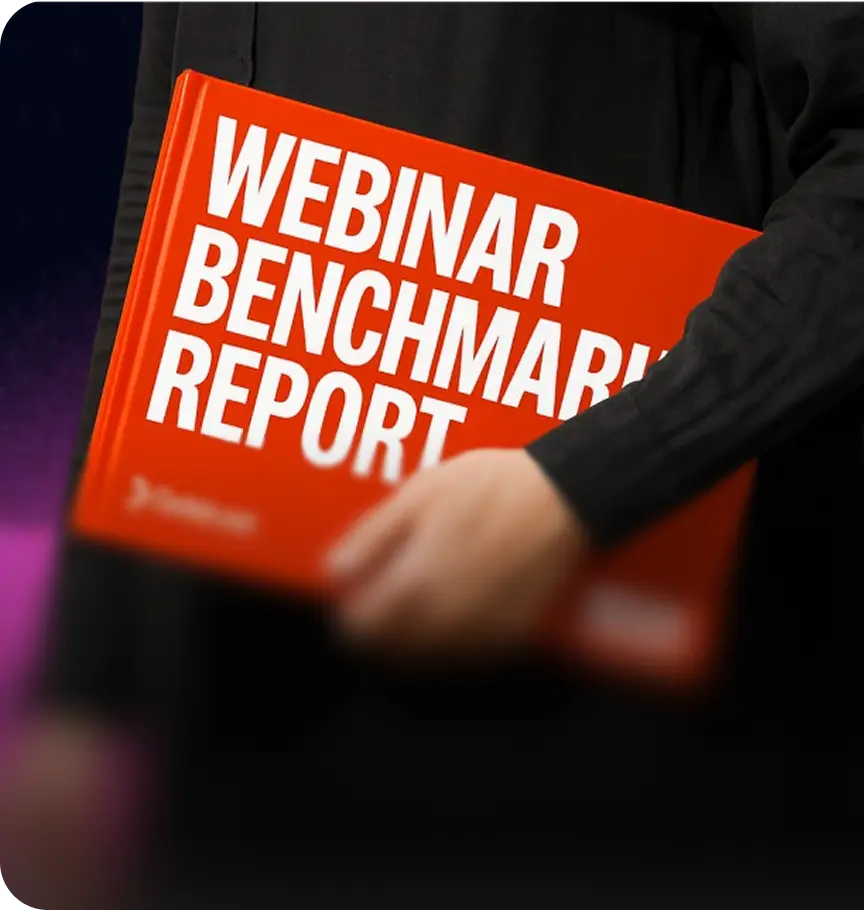Fueling Growth with Events: 5 Types of Events That Drive Revenue

Table of Contents
Maximize Your Marketing ROI
Join 10,000 other marketers already getting the best tips on running engaging events that boost pipeline and create raving fans.
The days of showing up to trade shows and returning to the office with little more than a stack of business cards are over. With deeper data at their fingertips, today’s B2B event marketers are responsible for way more than simply putting on a good show.
Modern field marketers must keep both eyes fixed firmly on revenue. And with increasing competition in the world of events, expectations to prove their value are higher than ever.
But between webinars, virtual conferences, customer summits, educational events, and more — it can be hard to know which type of event will best support your business goals.
Today, we’re taking inspiration from some of the top event formats B2B field and event marketers are using to generate pipeline growth.
The best types of B2B events:
- Conferences
- Summits
- Webinars
- Community events
- Product launches
💡 Looking for the best type of events for every stage of your buyer’s journey? Don’t miss our guide to Virtual Events Across the Funnel!
B2B events: the evolution 🧬
B2B events industry is a world away from where it was even a decade ago.
Event professionals back in the day would pop their logo onto the main stage, schedule a few keynote speakers, and tally up the business cards with the hope of securing a sale further down the line.
And don’t get us wrong–the magic of in-person events is still very real. But after the everything wrapped, event organizers were often left with the same question:
Was it worth the time and money?
Fast forward to the 2020s, and major tech advances have armed event marketers with unprecedented access to the data they need in order to strategically attribute real revenue to their B2B events.
Whether it’s boosting brand awareness, amplifying demand gen, or increasing product or service adoption, B2B event marketers finally have the data they need to help prove the impact of their work.
If you’re ready to harness those benefits and watch your revenue soar, it all starts with selecting the right type of event to support your goals and strategy. 👇🏻
📈 Where we were then looks a whole lot different to where we are now. Dive into how we got here (and what’s coming next) with our Event Marketing 3.0 Playbook!
The 5 best B2B event types to raise your revenue
Alright. We know the B2B event scene has changed over the years — and if you’re here, chances are you’re all-in for the upgrade.
But if you’re going to really take advantage of the ways in which modern event programs are evolving, you have to start getting hyper intentional about the types of events you’re creating.
Here are the five best B2B event formats to keep in your arsenal.
1. Conferences - a versatile event type for peak networking
The word ‘conference’ comes from the Latin ‘conferre’, which means ‘to bring together’. Fitting, right?
B2B conferences do exactly that — they bring together industry pros to discuss everything from news and trending topics, to major product shifts and developments.
With a formalized agenda, a few high-profile speakers and a ton of experience-driven networking activities, conferences are one of the most flexible event types out there.
B2B conferences can be approached in multiple ways, to solve multiple problems, with multiple revenue results. 😉
Let’s take a closer look at how some of the best field marketers in the biz boosted revenue with this type of event.
B2B conference case study #1
The problem-solving customer conference 💡
Onspring’s three-day customer conference, Onspring Connect, included training, workshops, and discussions designed to help customers succeed.“Our goal with Connect is instigating conversations between our customers that give them ideas on how to solve other business challenges,” says Megan Guerra, Director of Marketing at Onspring.
With plenty of opportunities for attendees to connect and converse via live Q&As and interactive breakout sessions, Onspring kept their virtual conference firmly focused on solving real problems for attendees — and the results speak for themselves.Onspring’s B2B conference results:
- 183% ROI
- 95% customer attendance
- 87% attendee engagement rate
- 8.8 hour average attendance time
B2B conference case study #2
The educational conference 🤓
Amid a global pandemic, language translation specialists Smartling set out to produce a conference that would educate the industry while creating a seamless, Netflix-like experience for their audience.
“Attendees from all over the globe were wowed by their experience at Global Ready Conference, and that's due in large part to Goldcast enabling us to host an event that was high-quality, compelling, interactive, and easy to navigate,” says Marketing Manager Kelsey Woodworth.
With pre-recorded content loaded into the platform, the Smartling team was able to focus on pulling every engagement lever they could to ensure attendees left the conference on a high. From a live set from the California Honeydrops band to intimate networking rooms and real-time Q&A — the team aced their attendance and interaction scores.
Smartling’s B2B conference results:
- 1.4k registrations
- 42% live attendance rate
- 112 minute average attendance time
- NPS score of 41
B2B conference case study #3
The brand-boosting conference ✅
For chaos engineering company Gremlin, conferences are an awesome opportunity to share their mission, while letting attendees know exactly how that mission benefits them.
But if Gremlin’s benefit-led Failover Conf was going to impact revenue, it couldn’t be just another salesy, self-serving experience. It had to deliver the hard-hitting content industry leaders crave — and in a super engaging format too.
With best-in-breed production tools, engagement functionalities and session options including panel discussions, fireside chats, seamless virtual booths and even cartoon marathon rooms — Gremlin’s conference produced incredible results that could be directly attributed to revenue.
Gremlin’s B2B conference results:
- 2k attendees
- 50% marketing qualified lead (MQL) rate
- 210 minute average attendance time
2. Summits - the most focused type of VIP event
When discussing B2B event types, the words ‘conference’ and ‘summit’ are often used synonymously. But there are a few key differences every field marketer should be aware of:
- Conferences are usually open to all, while summits are a little more exclusive (e.g., smaller groups of VIP accounts or C-suite attendees)
- Conferences cover a fairly wide range of topics, summits tend to have a more concentrated agenda.
- Conferences usually provide more opportunities to interact, while summits take more of a listen and learn approach supported by dedicated sessions for targeted networking.
- Conferences don’t always come with a price tag, whereas high-end summits may charge a high-end fee.
Now that we’re clear on what’s what, let’s dive into some of the various types of B2B virtual summits that can actually move the needle on revenue.
A seamless summit experience thatdoubles your paid attendees 💸
The Kong Summit is an annual event that brings the API specialist community together to discuss ideas, innovate, and network with like-minded peers.
With tickets starting at $499, Kong’s Director of Corporate Events and Partner Marketing, Melanie Salman knew she needed to nail it:
“We all have goals to expand our brands and to share our messages with relevant audiences. This event feeds both our goals, the partner goals to grow, and the attendee goals to learn.”
By supporting team, partner, and attendee success via bookable demo booths, multi-track session options and pre-recorded content from industry pros across the globe, the revenue impact of the Kong Summit went way beyond ticket sales alone.
Kong’s B2B summit results:
- Attendance rate doubled
- NPS score of 59
- 89% attendees rated 5/5
3. Webinars - the go-to event type for generating organic pipeline
When it comes to B2B events, webinars allow attendees and speakers to connect and interact — asking questions, knowledge-sharing, and networking from across the world.
In fact, for some 91% of marketers, webinars are integral to the success of their event strategy.
But with 53% of business professionals saying there are simply too many webinars to choose from right now, making yours stand out from the crowd is a tough task.
The way to solve it?
Make your webinar education. Make it interactive. And above all, make it memorable.
💻 There’s a whole new way to think about webinars. Get these nine webinar pro tips and make sure your webinars are fit for the future!
Gain thought-leader status with a practical webinar series 🧠
For parcelLab, webinars remain the ultimate way to become an authority in the industry: educating the people, building brand awareness, and positioning their org as the go-to resource on operations experience management.By making their webinars all about the attendees — with inclusive polling options, expert roundtables, and live Q&A interactions — when the time came for prospects to think about investing in an experience management platform, you can bet they knew exactly where to start.
parcelLab’s B2B webinar results:
- Boosted brand awareness
- Generated organic pipeline
- Increased product usage
- On-demand content to drive future registrations
✅ B2B webinar pro tip
For Goldcast’s Head of Growth, Kelly Cheng, if you’re going to produce a pipeline-generating webinar, it’s all about making the experience immersive.
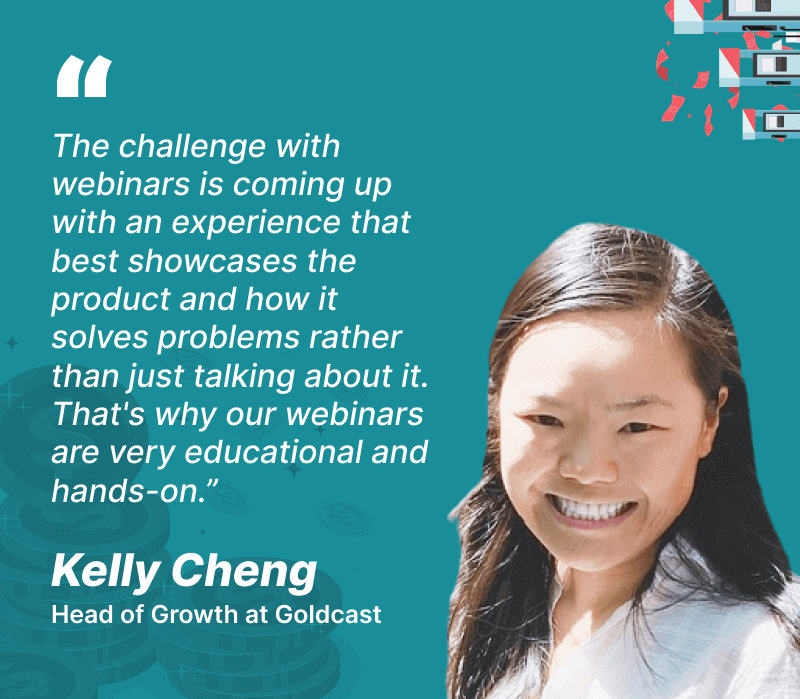
4. Community events - a B2B event that brings everyone together
Whether it’s a hackathon, fundraiser, workshop, fireside chat, or even a full-day multi-track conference, a community event is a great way to bring people together.
With customer community events, you’ve done the hard part — they’re already buying what you’re selling. Your job is to cement the relationship and increase product usage and adoption.As with other event types, it’s ok to try something new. For example:
- Educating attendees on how to use the product to get instant results
- Showing them what more they could be getting with a few simple tips
- Or, like the folks over at Alyce, making product adoption F.U.N.
Scale product adoption with just-for-fun community events 😎
For Alyce’s Senior Director of Revenue Marketing, Nina Butler, transforming brand promoters into brand loyalists was the goal.
As part of that mission, Nina and her team set to work curating a series of community events that would recreate the feeling of being on the sales floor: the BDR Gifting Power Hour.
The event included individual gifting rooms, a chat stream to join the ongoing convo, and the ability to engage with others via direct private message. With engagement features this irresistible, Alyce’s community events became the ideal way to drive brand loyalty by simply keeping it fun.
Alyce’s community event results:
- Second-highest pipeline generator in the company
- Attendee-level insights for revenue-focused follow-ups
- Analytics to assess and act on product adoption rates
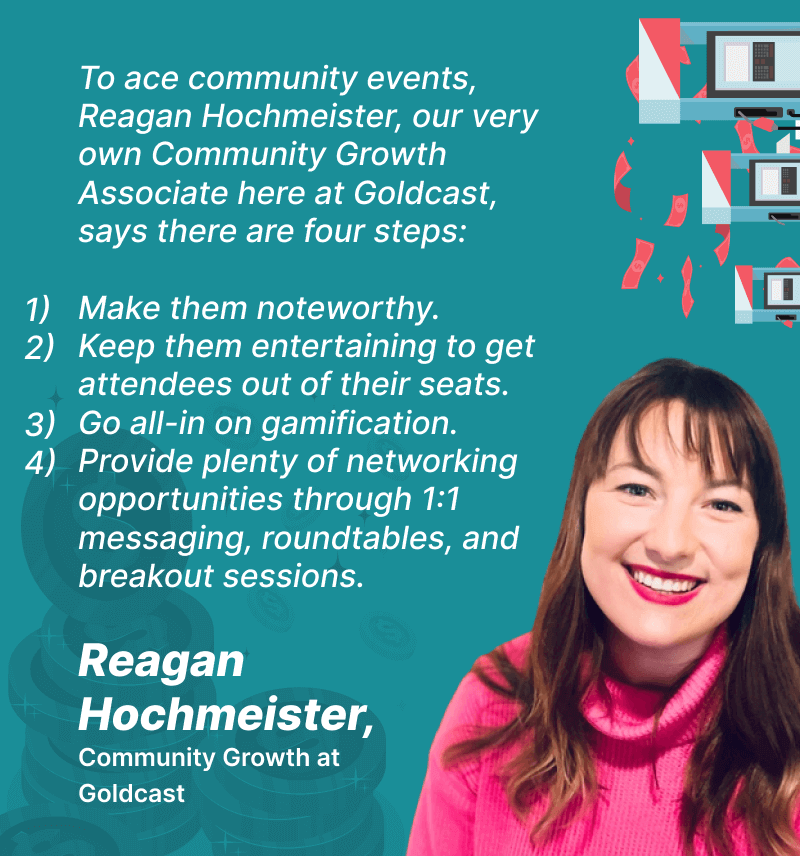
5. Launch events - the best type of event for building B2B buzz
Whether it’s a total rebrand, a market-first product or a fresh new feature to unveil, a well-planned launch event is guaranteed to make a splash.
By curating your invite list and including not only prospects and customers, but also media personnel and industry influencers — you can amplify your event reach and increase your chances of boosting revenue. But if a launch event is on the cards, remember it’s not about presenting your pitch deck. This type of event has to ooze authentic engagement to avoid coming across as salesy.
Build brand awareness with an unforgettable launch event 🚀
As one-click checkout specialists, the team at Bolt is all about simplifying the buying experience. To drive sales for new products and features releases, they scheduled launch events throughout the year to help showcase their offerings.
With live and pre-recorded demos and an ‘ask the expert’ Q&A session that always builds a buzz, the marketing team at Bolt solves customer pain points head-on at every event.
Raise revenue with launch events through:
- Boosting new feature awareness
- Increasing product adoption
- Upselling to pre-existing customers
- Driving customer retention
🚀 B2B launch event pro tip
For Goldcast Head of Events and Community Belinda Joseph, it’s important to leverage events for retention and advocacy too.
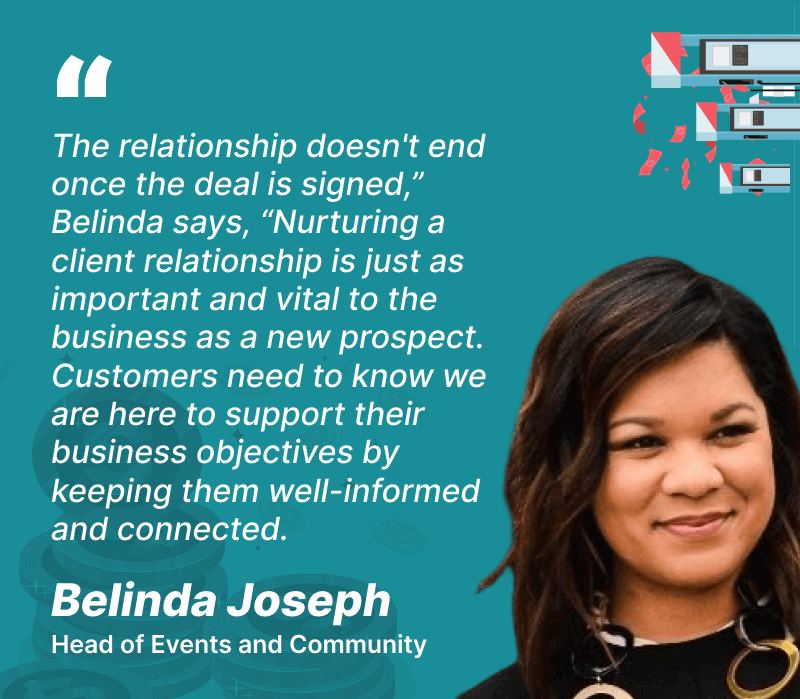
Not sure which type of B2B event to choose?
As a modern field marketer, you already know that variety really is the spice of event marketing life.
If you’re looking to build an event strategy that packs a serious punch when it comes to revenue, know that it’s ok to experiment with different types of events.
Because at the end of the day, different events cater to different goals. The more diverse event types you try out, the more you know which ones best support your audience and your bottom line.

Transform Your Video Marketing with AI
Stay In Touch
Platform
Resources
© 2025 Copyright Goldcast, Inc. All rights reserved.



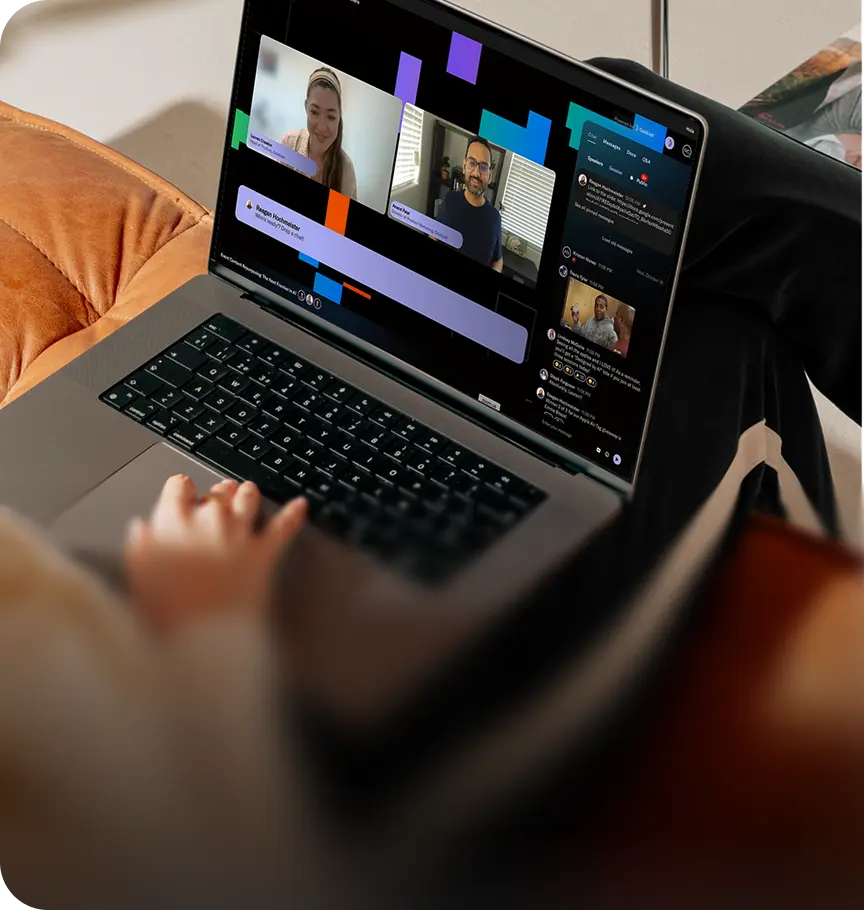

 Upcoming Events
Upcoming Events Event Series
Event Series On-Demand Events
On-Demand Events